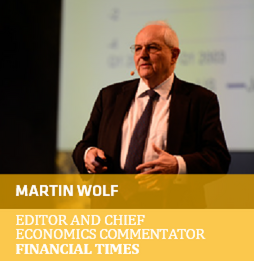Protectionism and shift towards Asia is redefining Global markets

Protectionism is the one consistent part of US President Donald Trump’s message, representing a decisive departure from the past, Martin Wolf, Editor and Chief Economics Commentator, Financial Times, told World Retail Congress delegates yesterday.
“Emerging Asia is now easily as large as North America economically, and the rise and rise of Asia means that there has never been as big a shift as there has over the past three decades,” he said. “And it isn’t over.”
Wolf added that Asia is far and away the fastest growing global region and that India is the fastest growing country but warned that the global economy remained at risk from a variety of challenges.
“Typically, when we look at crashes there are a number of factors – major wars, huge financial crises, conflict in the Middle East destabilising oil prices. There is as much debt around as there was pre-crisis although more biased towards government and the non- financial corporate sector, so it is not quite as volatile as before,” he said.
However, he added that debt sustainability looks “quite good” as 10-year bond rates are low compared with GDP growth.
But low interest rates mean that room for central bank manoeuvres is essentially gone. “If something went wrong, central banks would have very little ammunition left of a conventional kind,” he said. “In addition, China’s post-crisis debt explosion has been the result of encouragement of domestic investment and it now has an enormous debt over-hang.”
One of the results has been the rise of populism, a lot of nationalist views and inward-looking politics, he reflected. The result has been a slowdown in globalisation.
“Prior to the crisis world trade grew at about twice the rate of global GDP, but now is about the same, so the world has stopped being more open but is not yet more closed,” said Wolf. “If this continues, the US will have moved from being the most open market in the world to one similar to Brazil and India. Will this be enduring or will there be deals to end this?
)
)
)
)